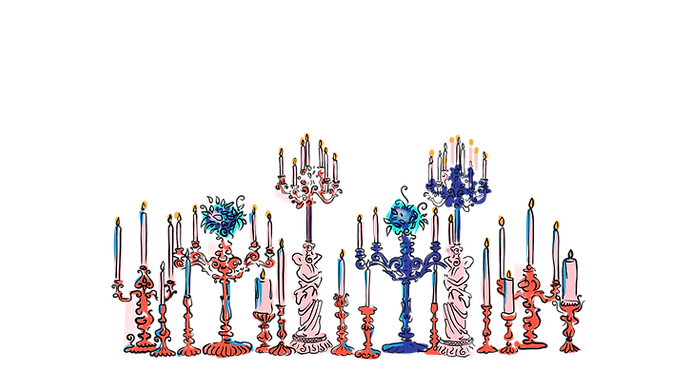
A FEAST IN TIME OF PLAGUE
PREMIERE
"Such songs I do not have, but let me sing
A hymn in honour of the Plague. I wrote
This hymn last evening after we had parted.
I felt the need, the first in all my life,
To write in rhyming lines."
CESAR CUI
JUNE
2021
ONLINE

A FEAST IN
TIME OF PLAGUE
Over the last year we have all been affected by the COVID-19 pandemic. It has taken the world by surprise, and so it is hard to believe that this situation is by far not unprecedented. Like COVID-19, the Plague of the 17th and 18th centuries also influenced the work of artists, giving fruition to philosophical discussions of the meaning of life and death that they encountered on a daily basis.


Drawing on the experiences of the past may give hope and encouragement that the hard-struck performing arts may recover, and even draw inspiration, from the current crisis.
This is why we have chosen César Cui’s opera A Feast in Time of Plague for this year’s Oxford Opera Society’s production as a fitting parallel to the desire to keep musical performances going despite the pandemic. The production is set in present-day Oxford with the opera itself being preceded by a concert of favourite arias from around Cui’s time. In this way the opera itself will be a thought-provoking reflection on the approach to post-lockdown cultural life.



The opera A Feast in Time of Plague (Пир во время чумы, Pir vo vremja čumy) was composed by Russian composer César Cui in 1900 as “dramatic scenes” in one act. The libretto was taken from the 1830 play A Feast in Time of Plague, one of the four Little Tragedies by Alexander Pushkin. Pushkin, however, was also drawing upon a previous model of John Wilson’s 1816 play The City of Plague. Each of the writers approached the topics of ‘death’ and ‘eternal life’ slightly differently, with Wilson presenting ‘death’ as a means of overcoming human suffering and Pushkin presenting ‘eternal life’ as a meeting with loved ones.
Cui’s setting of Pushkin’s text is an engaging musical “translation” of the different beliefs and attitudes that individual characters bring to the stage, without assuming any of them to be right or wrong. This production uses a chamber orchestra arrangement by Lucia Švecová which seeks to bring out the musical themes that Cui uses to present the individual stances of the characters, emphasizing that, whatever the right course of action, the grief and suffering experienced by different people cannot be compared.

And so, O Plague, we hail thy reign!
An opera from the twentieth century, based on a text from the nineteenth century, originally set in the seventeenth century, performed in the twenty-first century. What place can be more suitable as a setting for this opera than the Oxford bubble with its centuries of grim faces looking down from portraits across the city? But what is it that really connects those times? Is it over the top to compare the 1665 plague with the current pandemic? And is this even the right question?
A common theme between our own experiences and those of Cui’s characters is that everyone has their own trauma and that one cannot compare the grief and loss suffered by different people. But what we have sought to do in this production is to find ideas that would speak specifically to us 21st-century Europeans.

The first is privilege - even the fact that our characters are able to have a feast is a privilege. They are alive, they have the means to organise food, music, and drink - they can party. But this objective truth is juxtaposed with a second, more subjective truth: the longing for normality. People from 1665 London might not understand us complaining about being stuck at home surrounded by food, warmth, and technology, but still, we long for all that we cannot do - and particularly the warmth of social interaction.
But through all this progress and guilt, a third and most poignant theme emerges - the trauma of loss. Some people have lost loved ones, some people have lost their livelihoods. So have the characters in the opera. And even though they pretend that everything is normal (and try to force an appearance of normality), these are not normal times.
Having this in mind, we try to uncover the ways people might cope with trauma and what those mechanisms imply for the social dynamics in a society where nobody is allowed to be weak, to be openly hurt. There is no Iago, no Hagen and no Gessler in this opera, no clear antagonist. Each character believes they are doing the right thing (they are certainly doing their best), and yet none are happy at the end. Everyone is struggling to navigate the moral minefield of a feast in time of plague, but they cannot isolate themselves from the funeral bells outside, and there is no easy answer at the end.
So if we can learn one thing from the opera, it is that there is no quick way back to normality - our hardships cannot be compared, but others’ hardships also cannot be ignored. We all have to find our way, and when this is all over, we will probably have to forgive each other for our decisions while hopefully also learning from our mistakes as a society.
The staged performance of the production will be filmed in May 2021 and streamed for free on our website in June 2021. If you would like to support the production, You can donate online through JustGiving or
by bank transfer to Oxford Opera, sort code 30-80-45, account number 24030060.
We would be grateful for any donations, no matter
how small.

The sudden disappearance of most musical productions during lockdown has made every musician and artist grateful for any opportunity to engage in new projects and promote their art. This production, as one of the few projects that have been able to carry on, has offered such an opportunity to students, amateurs and professionals alike. We have been truly amazed by the enthusiasm for our production - our team has been joined by singers, players, directors, designers and producers from eight different countries, with professionals giving their time and sharing their expertise with the next generation of artists.
Moreover, despite the difficulties of the pandemic, we are very proud to be an inclusive and diverse ensemble. Every section of our team is over ⅔ women, and all of our casting has been age- and race-blind.

PLEASE MEET OUR CAST AND TEAM HERE:











































